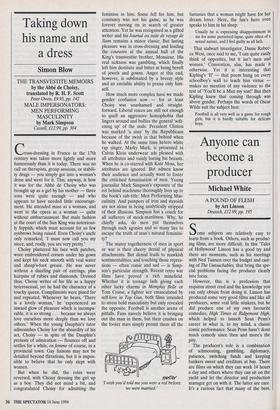Taking down his name and a dress
Simon Blow
Cross-dressing in France in the 17th century was taken more lightly and more humorously than it is today. There was no call on therapists, group sessions, or stabili- ty drugs — you simply got into a woman's dress and went for it. This, anyway, is how it was for the Abbe de Choisy who was brought up as a girl by his mother — three sons were quite enough — and who appears to have needed little encourage- ment. He attended mass as a woman, and went to the opera as a woman — quite without embarrassment. But male fashion at the court of the Sun King was notorious- ly foppish, which must account for so few eyebrows being raised. Even Choisy's uncle only remarked, 'I must now call you my niece, and, really, you are very pretty.'
Choisy plastered his face with patches, wore embroidered corsets under his gown and kept his neck smooth with veal water and sheep's-foot grease. He was never without a dazzling pair of earrings, plus hairpins of rubies and diamonds. Dressed thus, Choisy writes of his life as a happy heterosexual, yet he had the character of a touchy queen. Compliments were pined for and repeated. Whenever he hears, 'There is a lovely woman,' he 'experienced an inward glow of pleasure which is incompa- rable, it is so strong . . . because we always love ourselves more deeply than we love others.' When the young Dauphin's tutor admonishes Choisy for the absurdity of his act, Choisy — in spite of the Dauphin's protests of admiration — flounces off and settles for a while, en femme of course, in a provincial town. Gay liaisons may not be detailed beyond flirtations, but it is impos- sible to believe that he only slept with women.
But when he did, the roles were reversed, with Choisy dressing the girl up as a boy. They did not mind a bit, and congratulated Choisy for admitting the feminine in him. Some fell for him, but constancy was not his game, as he was forever moving on in search of greater attention. Yet he was recognised as a gifted writer and his Journal ou suite de voyage de Siam remains a minor classic. But lasting pleasure was in cross-dressing and leading the courante at the annual ball of the King's transvestite brother, Monsieur. His real sickness was gambling, which finally left him destitute and bitter at being bereft of jewels and gowns. Anger at this end, however, is sublimated by a breezy style and an enviable ability to praise only him- self.
How much more complex have we made gender confusion now — for at least Choisy was unashamed and straight- forward. Liberal voices are still not enough to quell an aggressive homophobia that lingers around and bullies the general 'soft- ening up' of the male. President Clinton was marked 'a sissy' by the Republicans because of the swish in that behind when he walked. At the same time hetero white rap singer, Marky Mark, is presented in Calvin Klein underwear ads pleased with all attributes and vainly baring his breasts. When he is co-starred with Kate Moss, her attributes are ignored. But admen know their audience and actually want to foster the criticised feminisation of men. Young journalist Mark Simpson's' exposure of the rot behind machismo thoroughly lives up to the book's sub-title: Men Performing Mas- culinity. And pumpers of iron and steroids are not alone in being analytically stripped of their illusions. Simpson has a couch for all sufferers of mock-manliness. Why, he chiefly asks, do men put themselves through such agonies and so many lies to escape the truth of man's natural feminini- ty?
The matey togetherness of men in sport or war is their cheery denial of physical attachments. But denial leads to mawkish sentimentalities, and touching those repres- sions — often comic and sad — is Simp- son's particular strength. Recent retro war films have proved a rich minefield. Whether it is teenage lads giving each other lucky charms in Memphis Belle or Tom Cruise, a fighter ace emasculated by self-love in Top Gun, both films intended to stress bold masculinity but only revealed the opposite. Football is another arena of pitfalls. Fans naively believe it is bringing out the man in them, but their crushes on the footer stars simply permit them all the 'I wish you'd told me you were a red before we were married.' fantasies that a woman might have for her dream lover. Here, the fan's hero even speaks to him in his sleep:
Usually he is expressing disappointment in me for some perceived lapse, quite often of a sexual nature, and I feel guilty as all hell.
That stalwart investigator, Dame Rebec- ca West, once said to me, can quite easily think of opposites, but it isn't men and women.' Convention, alas, has made it otherwise. Yet it is interesting that Kipling's 'If' — that poem hung on every schoolboy's wall to teach him virtue makes no mention of any violence to the test of 'You'll be a Man my son!' But then Kipling knew that coming through was above gender. Perhaps the words of Oscar Wilde suit the subject best:
Football is all very well as a game for rough girls, but it is hardly suitable for delicate boys.


























































 Previous page
Previous page